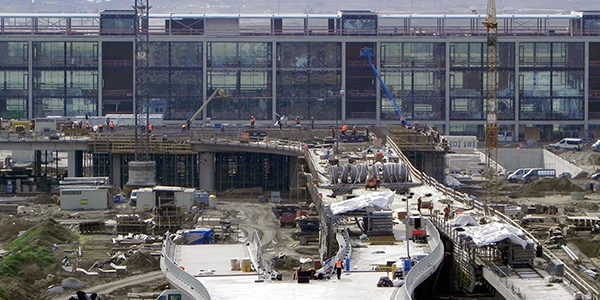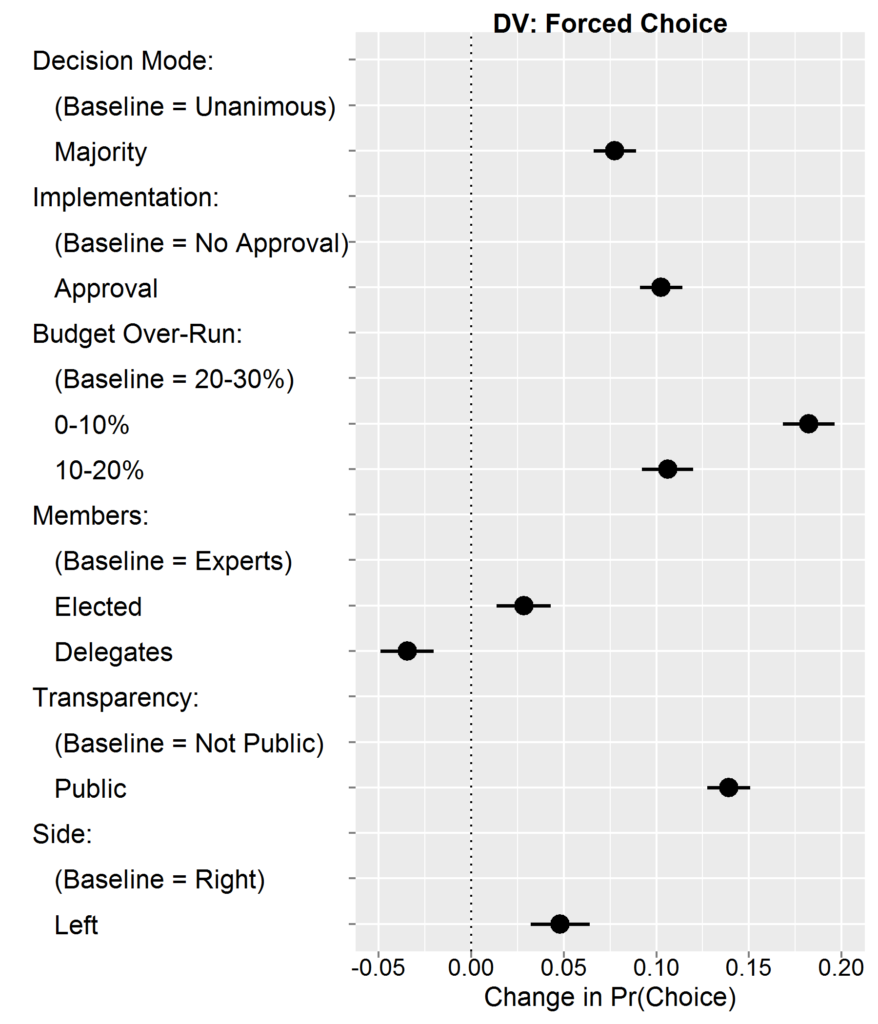Why it’s not just about the outcome: citizens also care about democratic decision-making
A well-known claim for citizens’ involvement in politics is that, when things are going well, they care little about participating in decision-making processes. Michael A. Strebel, Daniel Kübler and Frank Marcinkowski test this claim, and find that, in fact, democratic participation and transparency matter for citizens too, independently of the specific policy outcome.
 Berlin Brandenburg Airport (unfinished): Picture: By Robert Aehnelt via a CC BY-SA 3.0 licence, from Wikimedia Commons
Berlin Brandenburg Airport (unfinished): Picture: By Robert Aehnelt via a CC BY-SA 3.0 licence, from Wikimedia Commons
In the last decade the construction of a new airport in Berlin (BER) has stirred a lot of public attention and is the subject of ongoing controversies about the (mis)use of public money and about the lack of citizens’ involvement in planning processes. The initial budget has been vastly exceeded and there are strong indications of irregularities in the use of public money. The Flughafen Berlin Brandenburg GmbH (FBB), a publicly owned company overseeing the construction, was caught up in these mismanagement and corruption scandals, and the continued public pressure led to the resignation of several representatives, among them the then mayor of Berlin, Klaus Wowereit. Since these problems were revealed, there has been a continuing public interest in the events surrounding FBB and BER. Before that, however, there was seemingly little public interest in the airport construction.
A popular claim: citizens don’t want to be involved in politics when things are going well
This story fits a widespread narrative about when the general public is interested and wants to get involved in politics, namely when things take a wrong turn. That’s what two American political scientists John R. Hibbing and Elizabeth Theiss-Morse claim in a prominent book entitled Stealth Democracy. The authors argue that citizens do not really care about democratic procedures as long as they are not fooled by decision-makers. As long as everything is going smoothly and as long as they get what they want from politics, most people see no reason to engage in ‘tedious’ political decision-making processes. Put differently, proponents of stealth democracy would argue that citizens care about the ‘outputs’ from and the performance of the political system, but not so much about how these outputs come about, that is about the ‘input’ to and the ‘throughput’ in the political system. Only when there is some serious doubt about the outputs and the performance of the political system, are citizens interested in the possibility of intervening through democratic control mechanisms.
Empirical test: a survey experiment with 5,000 respondents in four West European countries
To test whether there is empirical evidence for this claim, we devised an experiment. In a representative survey of 5,000 individuals living in eight metropolitan areas in France, Germany, Switzerland and the United Kingdom, we asked respondents to evaluate fictitious commissions that would be established to plan and implement a major public transport infrastructure in their city-region. Respondents were presented with three tasks for choosing this commission. In each one, they had to choose between two options for the commission that randomly varied on five different attributes (see example below). The respondents had to indicate which of the two randomly assembled commissions they prefer. This so-called ‘conjoint experiment’ allows us to estimate – across all respondents – how important a certain attribute is for an individual’s choice. We can, for example, say how much the probability of choosing a commission changes for the average individual when the project budget is only exceeded by 0–10% rather than by 20–30%.
| Example of one choice given to respondents for the commission | ||
|---|---|---|
| [Scenario] Over the next 20 years an increase in traffic is expected for the [X] region. The existing public transport network is reaching its limits. Imagine that the public authorities in the [X] region have decided to build a new underground line to relieve traffic congestion. To do so, a commission is established to plan this new underground (routing, location of stops) and coordinate construction. How do you think this commission should be set up? How should it function? We will now present you three times with two possibilities. Please indicate each time, which of the two commissions you would prefer – regardless of whether you support a new underground line in the [X] region or not. |
||
| Attributes | Commission A | Commission B |
| The members of the commission…[Input: Members] | Are directly elected by the citizens of the [X] region | Represent the local authorities in the [X] region |
| Relationship of the commission with the public [Throughput: Transparency] | All documents and negotiations are public | All documents and negotiations are public |
| Cost awareness of the commission [Output: Budget over-run] | The project budget is exceeded by 20–30% | The project budget is exceeded by 0–10% |
| The commission makes decisions… [Formal authority: Decision mode] | Unanimously | Unanimously |
| The commission’s decisions … [Formal authority: Implementation] | Only come into force when approved by the local authorities in the [X] region | Come into force without further agreement of the local authorities in the [X] region |
| Which of these two commissions do you prefer? | □A | □B |
The main goal of our analysis was to assess how important the performance of a commission is compared to its democratic qualities and compared to its formal authority to make and implement decisions. For measuring performance, we varied the extent to which the project budget is exceeded as a straightforward indicator of ‘good governance’. To capture the democratic quality of a commission, we used two attributes: i.) how the commission is composed (of directly elected representatives, of local government delegates or of independent experts); and ii.) how transparent its decision-making process is (everything is public, or only the final decisions are public). Finally, to measure a commission’s formal authority, we vary the way it takes its decisions (by majority or unanimously) and whether it can implement its decisions without further approval of other governments in the area or not.
Results: citizens care about democratic procedures independently of the outcome
The basic results are displayed in the figure below. The x-axis shows the change in the probability of choosing a commission when an attribute changes from one level to another. For example, a commission with a budget over-run of 0–10% is almost 20 percentage points more likely to be chosen than a commission with a budget over-run of 20–30%. Other attributes have a lesser impact on citizens’ preferences, but they still make a difference. For example, citizens prefer commissions that are composed of directly elected representatives over commissions that consist of independent experts or of delegates from local governments. When it comes to the question of what citizens want from democratic governance, our results thus suggest that they primarily care about performance, but that democratic involvement and transparency in decision-making processes are important secondary features.
Do citizens care more about being involved in political processes when performance is bad? We have analysed whether the composition of the commission or the way it communicates with the public become more important when budget over-run is higher. We do not find any evidence for this to be the case, which goes against the popular ‘stealth democracy’ argument outlined above. However, we find that respondents care more about a commission’s composition when it can implement its decisions without requiring further approval of local governments in the area. This further suggests that citizens want to be able to influence and control decision-making bodies – independently of how well they perform.
Overall, our analysis shows that – in contrast to a widespread belief – citizens care about democratic procedures. This was also the case in the construction of Berlin airport prior to the delays, budget over-spending and corruption scandals: a significant number of citizens were involved in demonstrations against the planned runways and the lack of consultation of local interests in the planning process.
The bottom line is thus that if we want to strengthen public support for our democratic political systems, we should not only focus on the improvement of public services, but we should also provide citizens with meaningful opportunities to participate in democratic processes, and make sure democratic procedures are respected.
This article gives the views of the authors, not the position of Democratic Audit. It draws on the authors’ article ‘The importance of input and output legitimacy in democratic governance: Evidence from a population-based survey experiment in four West European countries’, published in the European Journal of Political Research.
About the authors
Michael A. Strebel is a PhD candidate at the Department of Political Science of the University of Zurich.
Daniel Kübler is Professor for Democracy and Public Governance at the Department of Political Science of the University of Zurich.
Frank Marcinkowski is Professor for Communication and Media Sciences at the Department of Social Sciences of the Heinrich Heine University Düsseldorf.






 Democratic Audit's core funding is provided by the Joseph Rowntree Charitable Trust. Additional funding is provided by the London School of Economics.
Democratic Audit's core funding is provided by the Joseph Rowntree Charitable Trust. Additional funding is provided by the London School of Economics.
Yes people care but they also firmly believe that those in charge will do what they want to anyway. They are fully aware that if they oppose, or try to find out information to stop corruption or graft, that they will be treated as if they are fools, belittled, and accused of not being competent to make a decision (eg the smearing by the elite of the 17 million who voted to leave the EU).
In the UK, when I was elected to the London Assembly, which “holds the Mayor to account” we were told we were barred from having all the type of commercial information you refer to in regard to the Berlin project “on grounds of commercial confidentiality”. If you are elected to hold to account and are barred from doing so, what price ‘citizens’ being able to do so?
It is all very well to speak in terms of theory but when the law is clear that you are barred from access to any useful information and are possibly jailed if you access it or raise it, well it just makes clear that the elite intends to carry on. “Consultation”? Just stick the usual apologists for those in power in place to whitewash what is going on, smear anyone who raises awkward issues and rub out any whistleblowers.
And that is why we have the rise, via social media and in the teeth of attacks from the established broadcasting networks and newspapers, of new powers and diverse parties/forces. UKIP, AfD et al. As long as the old forces carry on in the old way, determined to rub out meaningful oversight, the new forces will just grow – and some of these will be troubling.